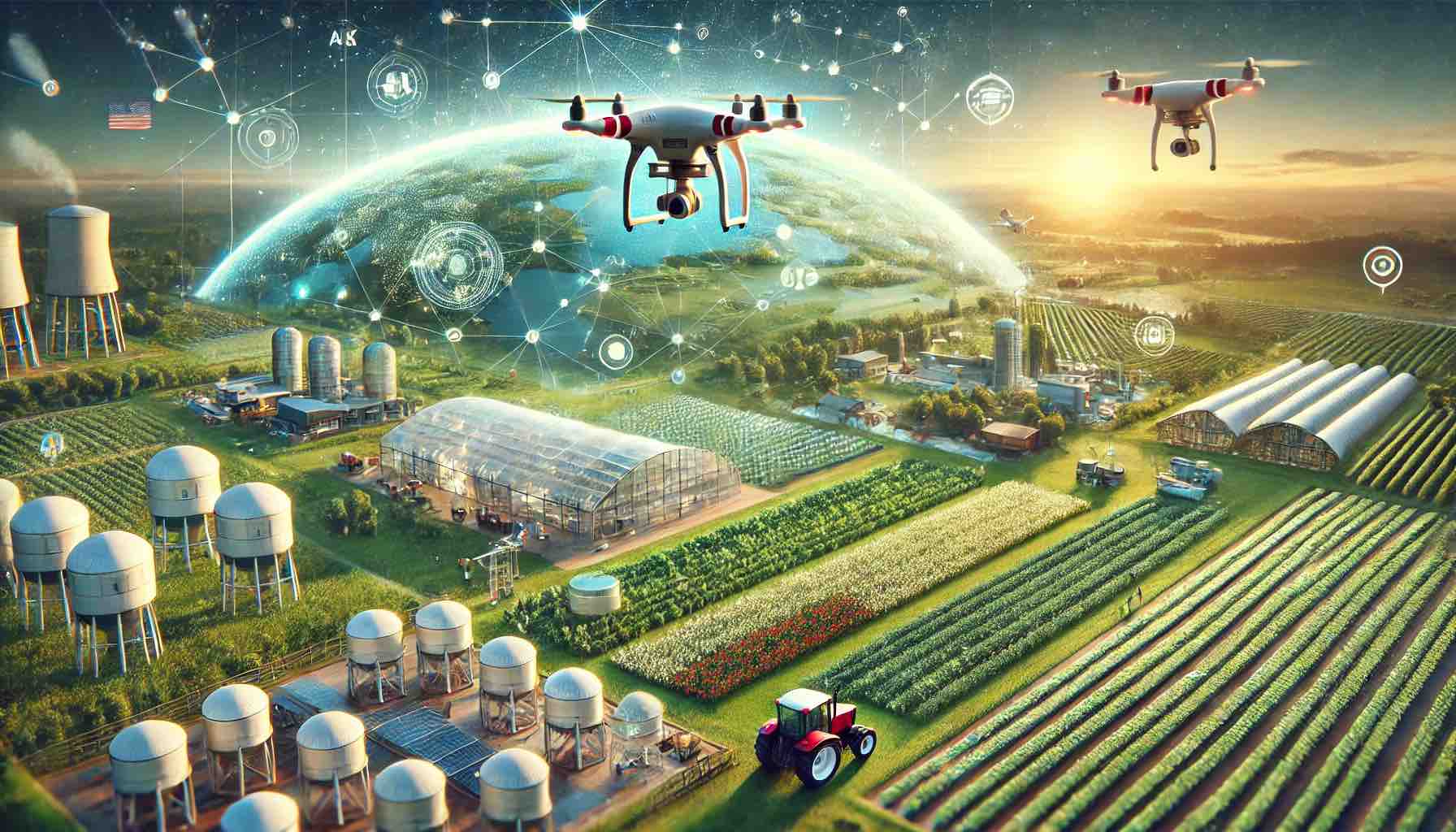

The agricultural industry is undergoing a technological revolution with the emergence of AgriTech startups. These companies are leveraging cutting-edge technology such as artificial intelligence (AI), robotics, data analytics, and IoT to solve some of the biggest challenges in modern agriculture, including food security, sustainability, and resource optimization. In this article, we explore some of the top AgriTech startups across London, Europe, Asia, India, the USA, Pakistan, and China, each playing a pivotal role in transforming agriculture for the future.
1. LettUs Grow (London, UK)
LettUs Grow is a leading AgriTech startup based in Bristol, UK, that focuses on sustainable indoor farming solutions. The company has developed an innovative aeroponic system that allows crops to grow without soil, using significantly less water than traditional farming methods. LettUs Grow’s system, combined with their AI-powered software, Ostara, helps farmers manage their crops more efficiently, monitor plant health, and reduce the environmental impact of agriculture.

The startup has gained attention for its potential to revolutionize urban farming, providing solutions that can be implemented in cities with limited access to arable land. By addressing key challenges in agriculture, such as food security and resource scarcity, LettUs Grow is becoming a prominent name in the AgriTech sector in the UK and beyond(Udacity).
Website: lettusgrow.com
2. Infarm (Germany, Europe)
Infarm, based in Berlin, Germany, is one of Europe’s most successful AgriTech startups, specializing in vertical farming. Infarm’s mission is to bring fresh and sustainable food production closer to urban areas by deploying indoor vertical farming systems in grocery stores, restaurants, and distribution centers. Their modular farming units use AI, IoT, and data analytics to monitor plant growth, optimize resource use, and deliver high-quality produce.

Infarm has expanded rapidly across Europe, partnering with major retailers such as Marks & Spencer, Aldi, and Carrefour to offer fresh, locally grown produce to consumers. The startup has raised significant investment to expand globally and is seen as a major player in the sustainable food production movement(Edstellar).
Website: infarm.com
3. Agricool (France, Europe)
Agricool is a French AgriTech startup based in Paris that focuses on urban farming through container-based agriculture. Using recycled shipping containers, Agricool grows fruits and vegetables in controlled environments, relying on vertical farming techniques and energy-efficient LED lighting. The company’s AI-powered system ensures optimal growing conditions for crops, leading to faster growth cycles and higher yields.

Agricool’s technology allows fresh, pesticide-free produce to be grown and harvested in urban settings, reducing transportation emissions and delivering fresher food to consumers. With increasing interest in local food production, Agricool is positioning itself as a leader in urban farming across Europe(LEK Consulting).
Website: agricool.co
4. Fasal (India)
Fasal, based in Bengaluru, India, is a rapidly growing AgriTech startup that offers a precision farming platform for smallholder farmers. The company’s AI-powered platform collects data from IoT devices installed in the fields to provide real-time insights on crop health, soil moisture, and weather conditions. Fasal’s solution helps farmers make data-driven decisions, optimize irrigation, and reduce the use of pesticides and fertilizers.

Fasal’s technology has had a significant impact on smallholder farmers in India, enabling them to increase crop yields and reduce water consumption. The startup has raised investment from several venture capital firms and is expanding its operations to other emerging markets in Asia(LEK Consulting).
Website: fasal.co
5. Taranis (Israel/USA)
Taranis, an AgriTech startup with headquarters in Israel and the USA, focuses on aerial imagery and AI-powered crop monitoring solutions. Using high-resolution images captured by drones and aircraft, Taranis provides farmers with detailed insights into crop health, pest infestations, and nutrient deficiencies. Their AI-powered platform analyzes this data and recommends precise actions to improve crop yield.

Taranis has expanded its operations across North and South America, working with large-scale farming operations to enhance precision agriculture practices. The company’s technology is transforming how farmers manage their fields, making it easier to detect and address issues before they impact the harvest(Edstellar).
Website: taranis.ag
6. Indigo Agriculture (USA)
Indigo Agriculture, based in Boston, Massachusetts, is one of the USA’s most well-funded AgriTech startups. The company applies microbial science and AI to improve crop health and yield. Indigo’s flagship product, Indigo Carbon, allows farmers to generate carbon credits by adopting regenerative farming practices that sequester carbon in the soil.

Indigo’s platform connects farmers, buyers, and traders through its Marketplace, enabling a more transparent and efficient agricultural supply chain. The company’s efforts to promote sustainable farming practices have positioned it as a leader in the regenerative agriculture movement in the USA(LEK Consulting).
Website: indigoag.com
7. Ricult (Pakistan)
Ricult, an AgriTech startup based in Pakistan, provides digital tools to support smallholder farmers. The company’s platform uses AI and data analytics to offer farmers personalized recommendations on crop management, weather forecasting, and financial planning. Ricult also provides access to credit and market linkages, helping farmers improve their productivity and income.

Ricult has gained significant traction in Pakistan and Thailand, working closely with NGOs and financial institutions to provide farmers with the tools they need to succeed in a challenging environment. As AgriTech continues to grow in Pakistan, Ricult is at the forefront of bringing technological innovation to agriculture(LEK Consulting).
Website: ricult.com
8. XAG (China)
XAG, headquartered in Guangzhou, China, is a leading player in the development of agricultural drones and robotics. The company provides AI-powered drones that are used for precision spraying, seed distribution, and crop monitoring. XAG’s technology allows farmers to automate labor-intensive tasks, reducing costs and improving efficiency.
XAG has expanded its operations globally, with a strong presence in countries such as Australia, Brazil, and Southeast Asia. The startup’s focus on AI and robotics is helping to transform China’s agricultural landscape, making it more efficient and sustainable(Edstellar).

Website: xag.cn
9. Meicai (China)
Meicai, based in Beijing, China, is a leading AgriTech startup that connects farmers with restaurants and food businesses through its digital platform. The company uses AI and data analytics to streamline the supply chain, allowing farmers to sell their produce directly to buyers, reducing waste and increasing profits.
Meicai’s platform has transformed the way food is distributed in China, particularly in urban areas. By cutting out intermediaries, the company has helped both farmers and buyers benefit from a more efficient supply chain(LEK Consulting).
Website: meicai.cn
10. Agribolo (India)
Agribolo, based in Jaipur, India, provides a digital platform that connects farmers with agricultural experts, buyers, and suppliers. Using AI and data analytics, Agribolo offers real-time solutions for crop management, market prices, and weather conditions. The platform aims to empower farmers with the information they need to make better decisions and improve their livelihoods.

Agribolo has a significant user base in rural India, and its digital platform is making it easier for farmers to access critical resources and services. The startup has garnered attention for its efforts to bridge the gap between traditional farming practices and modern technology(Edstellar).
Website: agribolo.com
Conclusion
AgriTech startups across London, Europe, Asia, India, the USA, Pakistan, and China are leading the charge in transforming the agricultural industry through innovation and technology. From AI-powered drones to vertical farming, these startups are addressing critical challenges such as food security, sustainability, and resource optimization. As the global population continues to grow and climate change poses new challenges, the role of technology in agriculture will only become more crucial. These AgriTech startups are well-positioned to play a key role in the future of farming, offering sustainable, efficient, and profitable solutions for farmers worldwide.
References
- Financial Times. “AgriTech Startups: The Next Frontier for Agriculture.” FT
- Bloomberg. “Top AgriTech Innovations Transforming Global Farming.” Bloomberg
- CNN. “AgriTech Startups to Watch in 2024.” CNN







